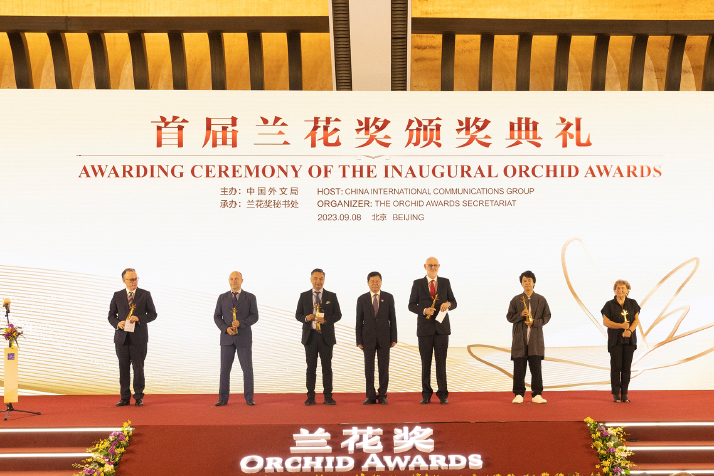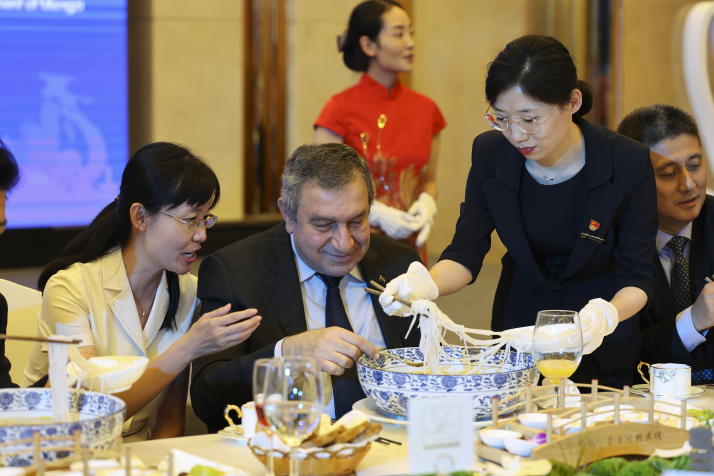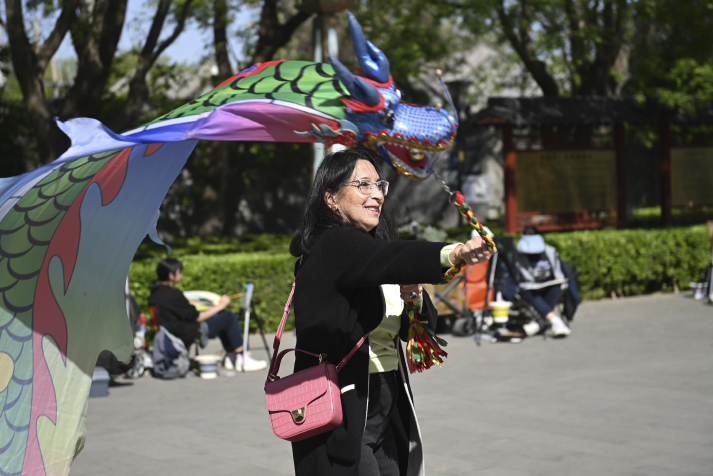| China |
| Orchid Awards honor cultural connectors | |
|
|
 The Awarding Ceremony of the Inaugural Orchid Awards in Beijing on September 8 (DUAN WEI)
Now in her 90s, Mexican academic Flora Botton Beja was one of the first academics in Latin America in the 1960s to focus her research on China. "It has been my life's work," she told Xinhua News Agency.
In the mid-1960s, she was awarded a UNESCO scholarship to pursue a master's degree in Oriental studies at El Colegio de México (Colmex), a Mexican institute of higher education, where she chose to pursue Chinese studies as her research direction. Later, she joined the Center for Asian and African Studies at Colmex, the first department in Latin America to focus on Chinese studies. She has promoted cultural exchange between China and Mexico through translation, teaching and writing. She has translated Chinese classics into Spanish, and written Spanish-language works on China, enriching the understanding of Chinese culture among Spanish-speaking readers. She has also mentored a number of sociology professionals in Latin America. "My academic career can be summarized as a love story between me and China—because love is loyal and long-lasting," Botton said. On September 8, Botton's decades of dedication were recognized by the inaugural Orchid Awards. Initiated by China International Communications Group (CICG) in 2022, the awards recognize non-Chinese individuals and organizations that have furthered international cultural exchange and advanced mutual understanding between China and other civilizations. Botton was one of 10 recipients who received Orchid Awards at a ceremony in Beijing. "The awards aim to foster understanding and trust among people from different nations through cultural exchange," Du Zhanyuan, President of CICG and Chair of the awards expert committee, said at the ceremony. "Today, the world is facing intertwined challenges and crises… We should promote inclusiveness and strengthen international dialogue and cooperation."  At the Orchid Awards banquet in Beijing on September 7, award recipient Essam Sharaf, former Prime Minister of Egypt, enjoys guoqiao mixian, or "crossing-the-bridge rice noodles," a celebrated dish from Yunnan Province, chosen to symbolize the bridging of cultures (COURTESY PHOTO)
A celebration of friendship Having been cultivated in China for over 2,000 years, orchids, with their quiet elegance and faint aroma, symbolize a person's noble character and behavior in Chinese culture. They are also often used as a symbol of friendship. The term jinlan, literally translated as "gold orchid," represents strong friendship. For these reasons, the flower perfectly represents the features of the award recipients, who have distinguished themselves in their own fields while all having a profound understanding of and love for the Chinese culture, have long committed to enhancing cultural exchange between China and the global community, and have promoted mutual learning among diverse civilizations. The Orchid Awards span three categories: Lifetime Honorary Prize, Outstanding Achievement Prize and Friendship Envoy Prize, with recipients chosen based on their achievements, contributions and global influence. The Friendship Envoy Award specifically acknowledges those fostering cross-cultural comprehension and mutual respect. Potential candidates can nominate themselves or be nominated by an organization, such as Chinese embassies and consulates abroad, and foreign embassies and consulates in China. Candidates should work in cultural sectors, including but not limited to literature, art, film and television, publishing, translation, education, science and technology, health, media, folk culture, digital culture and people-to-people exchange, according to the announcement of the awards expert committee. The call for nominees garnered attention from around the globe, receiving more than 300 individual applications and submissions from 33 organizations, covering approximately 80 countries and regions, including the U.S., Japan, Germany, Egypt, Mexico, Thailand, Russia and South Africa. Focusing on general cultural themes, the awards serve as one of the latest platforms to foster humanity's shared values and implement the China-proposed Global Civilizations Initiative, which defends diversity and considers culture an opportunity for dialogue and deliberation. "There are more than 200 countries and regions, over 2,500 ethnic groups, and multiple religions in the world, which have nurtured different civilizations based on different historical and national conditions, customs, as well as other factors," Du said. "The communication between civilizations has faced many constraints, but the efforts of human society to promote the exchange of civilizations have never stopped." "The history of cultural exchange between China and the rest of the world over the past 3,000 years is essentially a history of contact, collision, combination and variation of elements of different civilizations," Du added.  The awarding ceremony of the inaugural Orchid Awards takes place in Beijing on September 8 (CNSPHOTO)
Communicating China "It is important that China understands fundamental cultural differences in mindset between the Chinese and, notably, Western people," said David Ferguson, another international communication expert, who also received an Orchid Award. The 67-year-old Scotsman gained this perspective from 17 years of living and working in China. Before he first arrived in China, he had learned about China through Western media. After he arrived, he found that what was happening was completely different from what he had read about the country before. And he decided to confront and correct the Western misconceptions and tell the truth about China. He has visited multiple Chinese cities and written books about them. As an English editor at Foreign Languages Press, a publishing house focusing on releasing Chinese works into different languages, he has also been working on the English version of volumes of Xi Jinping: The Governance of China, a compilation of spoken and written works of President Xi Jinping, who is also general secretary of the Communist Party of China Central Committee, and a definitive work that comprehensively and systematically reflects Xi Jinping Thought on Socialism with Chinese Characteristics for a New Era. Ferguson said Xi Jinping Thought on Socialism with Chinese Characteristics for a New Era is a huge structure. "It's a window to know China. If you want to understand what President Xi is talking about, you have to understand how the Chinese people think," he explained. "I think the biggest challenge we face is trying to transform messages that are created, in Chinese, from a Chinese perspective, into messages that are effective in targeting a Western audience," he said. He explained that Chinese discourse is much more about facts and figures, while the Western one is much more about engaging with people on a human level, and that's the thing that China needs to learn to do better. Despite the current misunderstanding many Westerners have about China, Ferguson is positive about the potential for improving the country's image globally. "The young generations in China, with their proficient language skills and global insight, have a very important part to play in communicating the real China to the rest of the world," he told Beijing Review. Arts for amity Australian arts patron and former diplomat Carrillo Gantner, who also received an Orchid Award, believes that artists are the best friendship ambassadors as they speak the common language of the human hearts. Gantner, like many non-Chinese, discovered China initially through food. Australia has a big Chinese community, and Chinese food was a part of his growing-up. Later, he became more familiar with the country through communicating with a sociologist who is a family friend. During his first visit to China in 1977, Gantner enjoyed performances including acrobatics, Peking Opera, drama and dance, which further stimulated his interest in the ancient country. "My own life has been enriched by the works of so many great Chinese artists," he said. In 1985, Gantner became the cultural counselor at the Australian Embassy in China and worked on a wide variety of cultural activities. For example, he was involved in the negotiation on sending two pandas from China to Australia, and directed a classic Australian play for the Shanghai People's Art Theater titled Xiang Ru Fei Fei, or A Stretch of the Imagination, which is widely considered to be the first one-person show ever to be performed in China, performed by veteran Chinese actor Wei Zongwan. Gantner said that culture, in all dimensions, including performing arts, visual arts, education, language,history and sports, brings people more closely together. "It teaches them about the other," he told Xinhua. "When you know something about the other, people are less fearful. It reminds people that we share a common humanity, and a desire to live in peace and friendship." "So cultural exchanges can remove the politics and let us deal at a human level directly and openly," he added. Like Gantner, Ryo Takeuchi, an Orchid Award winner and China-based Japanese director, has been promoting communication between China and his country with a series of Chinese-themed documentaries he made, including ones detailing China's efforts in combating COVID-19, Long Time No See, Wuhan and China's Post-Pandemic Era: Winning Against All Odds. Since 2015, he has been filming The Reason I Live Here, using the camera to record the Chinese people living in Japan and the Japanese people living in China. Currently, this documentary series is in its fourth season. In 2021, he directed Faces of HUAWEI. He talked to Huawei staff, customers, suppliers and other partners to find out what the Chinese tech titan is all about. "At first, I only knew that Huawei was a mobile phone company. Why did the U.S. impose sanctions on such an ordinary company? This aroused my curiosity," he said. How can creators tell China's stories well? Takeuchi said he feels that realistic works are usually the ones that touch audiences the most. So he aims for his works to remain objective and impartial, to allow audiences to form their own opinions on China. "Some documentaries about China made by Japanese, European and American media mainly feature criticisms, while some documentaries made by Chinese media are the contrary," he said, adding that although his documentaries cannot be completely objective, but he tries to be relatively neutral and authentic. "I hope that more people can learn about the real China through my films, even a little," Takeuchi said as he received his award. (Print Edition Title: Fragrance of Friendship) Copyedited by G.P. Wilson Comments to luyan@cicgamericas.com |
|
||||||||||||||||||||||||||||
|
